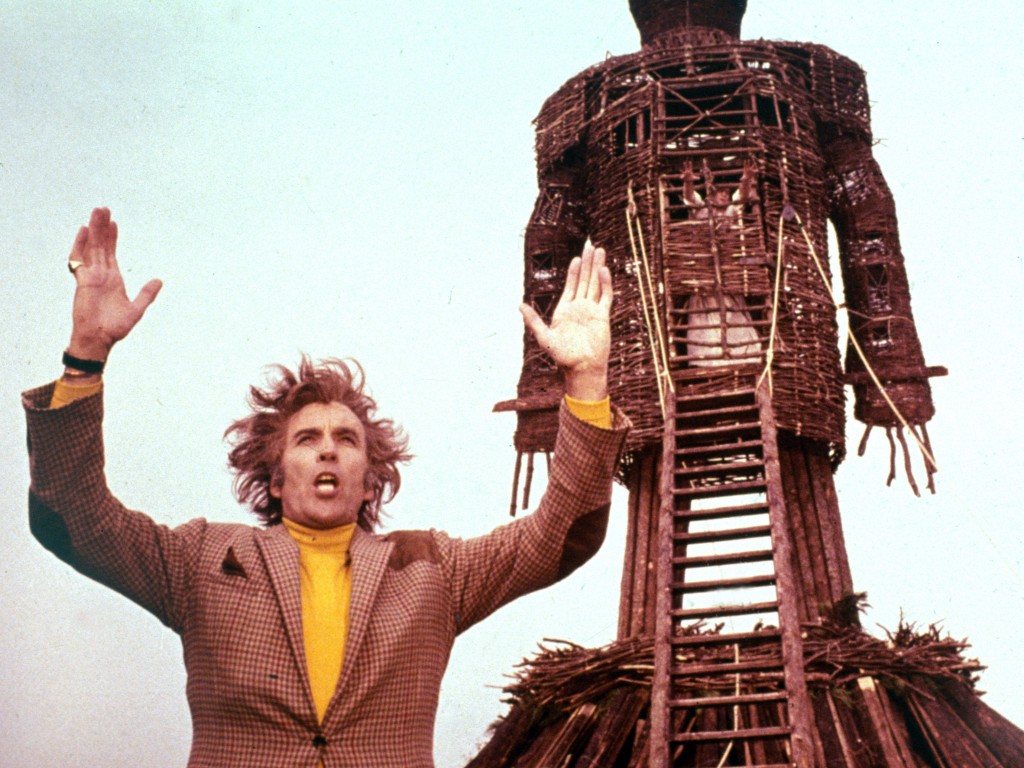 When I think of Christopher Lee, it’s not Star Wars or Hobbits or Bond villains. Tall, suave, handsome, debonair, Bit was his collaboration with Hammer Films that sucked me in. It is also this that rocketed him to fame, the actor becoming synonymous with horror thanks to his spellbinding performances as many Draculas, The Mummy and Frankenstein’s monster. His performances as Dracula have become the iconic and shaped the way the character has been viewed ever since. But it is the film The Wicker Man that cemented Lee as my all time favorite actor. And if you haven’t seen it you are insane because it is on of the greatest films ever made. I’m not kidding. It was once hailed by Cinefantastique as “the Citizen Kane of horror movies”. Christopher Lee thought it was his finest work and best film, ( “Wonderful film … “Its power lies in the fact that you never expect what eventually happens, because everyone is so nice”).
When I think of Christopher Lee, it’s not Star Wars or Hobbits or Bond villains. Tall, suave, handsome, debonair, Bit was his collaboration with Hammer Films that sucked me in. It is also this that rocketed him to fame, the actor becoming synonymous with horror thanks to his spellbinding performances as many Draculas, The Mummy and Frankenstein’s monster. His performances as Dracula have become the iconic and shaped the way the character has been viewed ever since. But it is the film The Wicker Man that cemented Lee as my all time favorite actor. And if you haven’t seen it you are insane because it is on of the greatest films ever made. I’m not kidding. It was once hailed by Cinefantastique as “the Citizen Kane of horror movies”. Christopher Lee thought it was his finest work and best film, ( “Wonderful film … “Its power lies in the fact that you never expect what eventually happens, because everyone is so nice”).
The 1973 cult classic is a chilling, unpredictable and unconventional departure from British horror tradition at the time and is unlike any horror film I have ever seen. Set in a fictional Hebridian island demented by paganism. Beautiful aerial shots of the Scottish Coast, strangely catchy gospel music, an eerie and unsettling atmosphere and a gripping mystery.

The tale of a good and deeply religious police officer sent to a small island off the coast of Scotland to find a missing girl, the film is deeply, deeply disturbing on every goddamn level. Edward Woodward is Sergeant Howie, a good and deeply religious Calvinist policeman who travels to Summerisle, a re
mote island off the west coast of Scotland, to investigate reports of a local girl’s disappearance. Once there, he finds his solid Christian beliefs confronted by a community dabbling in all manner of dubious pagan practices (including sun worship, fertility rituals and Britt Ekland, dancing naked), and begins to suspect the islanders of knowing more about what happened to the missing girl than they’re letting on. Woodward, pious and stoic, dogged and doomed, leads us through a series of interviews with the islanders, leaving the audience to pick up on things he doesn’t see.

The good Sergeant’s determination to stay true to his beliefs is what lands him in seriously hot water. The island is lorded over my Lord Summersisle (Lee), who is quite spellbinding, the character’s Pagan madness somehow sounding convincing when spoken by the great actor. Sergeant Howie adheres to a strict code of Presbyterian morality, and is suspicious and repulsed by the townsfolk’s peculiar behaviour. He believes in directly opposing ideologies; good vs. evil, Christianity vs. Paganism, reality vs. unreality, and on one level we sympathise with his plight – he’s simply a cop trying to solve a case. On another level it appears (for a while, at least) that the charming Lord Summerisle, who discusses his community’s beliefs (and current predicament) with authority and conviction, is relatively harmless too. The townsfolk ‘could’ be offended by Howie’s narrow-mind edness and threats to report them.

The Wicker Man is influential not just on subsequent horror cinema, but on the thriller genre in general in the way it sets an artfully composed series of traps for its unwitting protagonist, expertly wrong-footing both him and the audience until the devastating ending, set to the world’s most disturbing rendition of the folksong Summer is Icumen In, which makes it clear that Sergeant Howie was correct in assuming there was an island-wide conspiracy – but horribly wrong about its precise nature. Once seen, never forgotten, The Wicker Man is a terrifying fever dream of a movie, and I won’t spoil the bitterly upsetting ending for you.

Christopher Lee 1922 – 2015